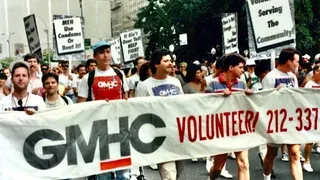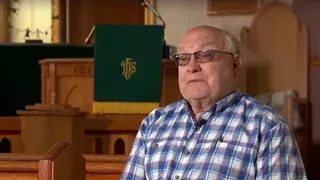November 10, 2011
Ugandan Gay Activist Honored on Capitol Hill
Michael K. Lavers READ TIME: 3 MIN.
Frank Mugisha was inside the Ugandan Parliament building in Kampala in May when they learned that lawmakers were to once again debate the so-called Anti-Homosexuality Bill. The measure would impose the death penalty upon anyone who was found guilty of repeated same-sex sexual acts. Mugisha and another activist who were in the chamber had a far more immediate concern: certain arrest.
"My hands were cold and sweaty, I was sick," said Mugisha, executive director of Sexual Minorities Uganda (SMUG), a network of Ugandan organizations that advocate on behalf of LGBT and intersex people in the East African country. "I was shaking and then I got word that it was being debated by members of Parliament themselves."
Mugisha received the 2011 Robert F. Kennedy Human Rights Awards at a Capitol Hill ceremony on Thursday, Nov. 10. Ethel and Kerry Kennedy, U.S. Sen. John Kerry (D-Mass.), Democratic National Committee Treasurer Andrew Tobias, Democratic strategist Donna Brazile and Assistant Secretary of State Michael Posner were among the hundreds who packed the Kennedy Caucus Room at the Russell Senate Office Building.
"We may not be recognized and organized in our communities, but with this award we know we are being heard and there is hope," said Mugisha.
Founded in 2004; SMUG uses public awareness campaigns to increase LGBT visibility. It organizes local activists and lobbies government officials to support the inclusion of gay men in national HIV/AIDS prevention strategies and other measures. SMUG also helps gay men who are arrested under the country's anti-homosexuality laws to find lawyers to represent them in court-Mugisha himself was smuggled out of Uganda in 2007 after authorities threatened to arrest him after he came out in a 45-day public awareness campaign. He eventually returned to Uganda and resumed his activism.
Mugisha spoke with EDGE after he took part in a panel on sexuality and intolerance in East Africa at a Washington, D.C., restaurant on Wednesday, Nov. 9.
"SMUB stated because LGBT people were fed up," he said.
Parliamentarian David Bahati first introduced the Anti-Homosexuality Bill in Oct. 2009. An estimated 80 percent of Ugandans support the measure, but Mugisha blames both American Evangelicals and the local media for stoking anti-LGBT sentiments. A newspaper published the names of gay men in April 2009; while the tabloid Rolling Stone printed the names, pictures and home addresses of gay Ugandans in Oct. 2010 with a front page banner that read "hang them."
"Very many, gay, lesbian and transgender people fear to come out and tell anyone they are homosexual because of what they read in the media," said Mugisha, referring to the Rolling Stone cover. "When I read the paper, my first reaction was not reading my name, but what was going to happen to people who were not out."
The Uganda High Court ordered Rolling Stone to pay damages and to stop publishing the names of people it suspected were gay after David Kato, who was SMUG's then-advocacy and litigation officer, and other activists sued the tabloid. Kato was beaten to death with a hammer in his home near Kampala on Jan. 25.
"It was one of those moments when I was so, so scared because David was murdered in his house," Mugisha solemnly recalled. "David wasn't working or on the street at a demonstration. He was at his home... and for me that was so scary that someone walked to his house and killed him."
Both President Barack Obama and Secretary of State Hillary Clinton urged the Ugandan government to investigate Kato's death and prosecute those who were responsible. A Ugandan court on Nov. 9 sentenced Nsubuga "Enock" Sydney to 30 years in prison for Kato's murder, but anti-LGBT discrimination, violence and even deaths remain a pervasive problem in Uganda.
"There are five activists who are publicly out there-five of 32 million people," Kerry Kennedy, president of the Robert F. Kennedy Center for Justice and Human Rights, noted to EDGE. The organization that is named in honor of her late father will not only donate money to SMUG, but will enter into a six year partnership with the organization to further its advocacy on behalf of Uganda's sexual minorities.
"One of his [Mugisha's] best friends was assassinated eight months ago in his own home," added Kennedy. "He gets up every morning, he answers the phone, he goes to the prison and he carries his people. He's just a man of just amazing vision and love."
It is this hope that allows Mugisha and his colleagues to get through another day.
"With all the hostility, with all the violence, we live for the hope of our people and ourselves," he said. "Everything we do can change something."
Based in Washington, D.C., Michael K. Lavers has appeared in the New York Times, BBC, WNYC, Huffington Post, Village Voice, Advocate and other mainstream and LGBT media outlets. He is an unapologetic political junkie who thoroughly enjoys living inside the Beltway.




